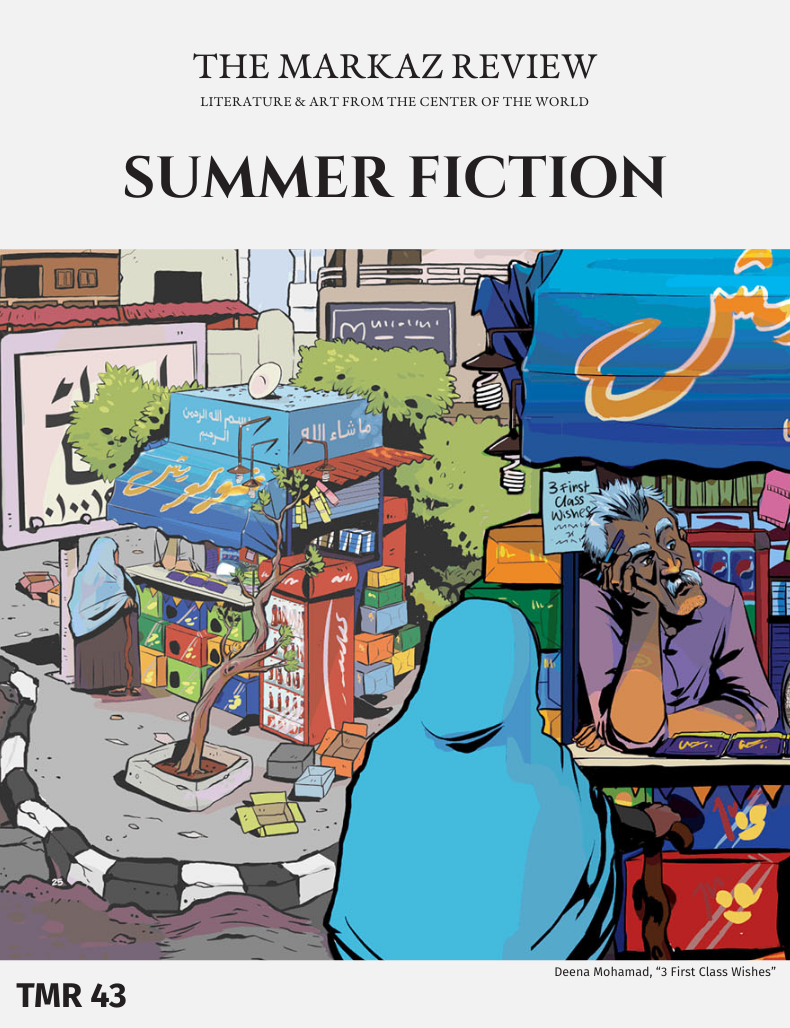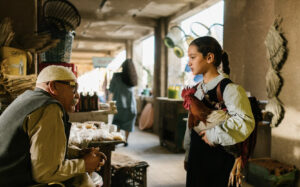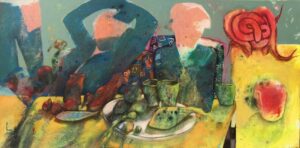Picked off one by one, unlikely victims of the Islamic State wait in a warehouse in Mosul.
In the past, many years before, back when she used to wish she would turn into a real flesh-and-blood girl, a man bought her from a doll store in Mosul. He proceeded to give her to his seven-year-old daughter Ghada, because she had done so well in school and was moving up to second grade.
Ghada was a good girl, polite and beautiful. She wasn’t intent on ripping off the doll’s limbs or tearing off her belly button, like other girls did with theirs as soon as they got bored of them. Ghada would wash her and comb her hair, dress her in the clothes that her mother would sew, rock her in her arms, and wrap her neck in a purple scarf all the time. She would put her to sleep on her chest until she dozed off with the doll in her arms. And on top of all that, she named her Tala and took her with her wherever she went, except for school.
When Ghada grew up and went to university, she didn’t get rid of her doll, or toss her in some dark corner of the closet, or give her to a girl from a decent family. Instead, she held on to her and hung her up over her mirror.
Suddenly, one day in June 2014, the family left its house behind, for reasons that seemed unclear to Tala at the time. But from the state of panic and confusion, she could sense that it was about escaping from something that seemed dangerous, and that threatened the lives of the family members. Ghada didn’t take her with her. It had been a long time since she had done that, now that she was grown up.
Tala stayed in the house all by herself, not knowing what was going on, or what she should do. She spent her time looking through the window panes and waiting for Ghada and her family to return. But in vain. She didn’t know what was happening outside. She could hear only the sounds of gunfire, which went on for two days, before silence prevailed on the third day.
“War,” she said to herself. “What else could it be?”
That night, Tala heard a clamor coming from the garden. She took it as a good sign. All she could think was that it was Ghada’s family. They had returned home at last. But later she was shocked when she realized that it was three people, carrying weapons and with their faces masked. They broke open the lock to the door and entered the room where she was lying on one of the sofas. The three people spent the night in the house. And in the morning, they left, taking with them some bedding and kitchenware, and Tala, too. One of them had picked her up, and started examining her to make sure that she could still produce that sound like crying that comes out of her middle.
Tala didn’t know what these men were doing with a small doll like her. She thought she had impressed the bearded man who picked her up, and that now he was planning to take her to his young daughter, so she could play with her. But she was surprised when he tossed her into a dark room, in some anonymous place in this remarkable country that doesn’t know stability. Tala didn’t know where she was, only that on the morning of the following day, when she woke up, she found herself, dumbfounded, in an unremarkable room that resembled a warehouse, surrounded by dolls of different kinds, sizes, and shapes. They were giving her mysterious looks, with suspicious eyes whose intentions she couldn’t make out, until the doll Annabelle asked her what her name was.
“Tala,” she replied.
“Welcome to doll jail,” said Annabelle, after the rest of the dolls had moved away from her. “Just hope that you aren’t next!”
Tala didn’t understand what this scary doll meant by that.
“What’s happening here?”
Tala had hardly finished her question when she heard the voice of a sock doll at the door repeating a cryptic word. Tala understood at once that it was a word of warning: “Ssssssst!”
The dolls threw themselves down in postures like rigid corpses everywhere. Tala did the same, as if she’d had previous training for it. After that, she heard the door creak as it opened, then heavy footfalls on the floor tiles. It seemed that someone had just come in, and had begun kicking the dolls in his path, pushing them aside with his foot. Sometimes he stepped on them and they made their sounds, which distinguished the talking dolls made of cloth, silicone, and rubber from other ones. He paused near Tala. She could hear him breathing as he leaned over and picked up a doll next to her, then left the room.
The dolls got up, and began examining each other, amid the prevailing noise and hubbub about the next victim.
“Where’s Barbie?” Annabelle called out. “Has anyone seen Barbie?”
Everyone was silent, in a state of anticipation, before Pinocchio announced, in a voice like someone announcing someone’s death: “Barbie is missing.” A cloth doll confirmed it, saying, “They took Barbie!”
Everyone burst out crying like children, with the exception of a big doll named Anna Karenina. At first, Tala thought that maybe she was a real girl, because of her large size and how close her features were to those of an eighteen- or nineteen-year-old. This young woman doll didn’t seem to care about what was happening, which perhaps was why the rest of the dolls despised her. She was always squeezed into the corner, and spent all her free time putting on red lipstick while looking into a hand mirror. As for the clothes she wore, they were—to put it mildly—scandalously revealing, designed to be arousing. From the start, Tala guessed that everyone avoided her and that she was isolated—no one came near her or even spoke to her. She gave Tala a strange, mysterious look, then went back to looking at her mirror. Tala asked Annabelle about her, and Annabelle advised her not to get too close to her.
“Why?” she asked.
“Because she’s a bad girl,” Annabelle replied.
“Where did they take Barbie?”
“To the training room,” the doll replied, drawing her finger across her neck in a throat-slitting gesture.
“Really?” Tala cried out, feeling scared.
“Yes. They use us to train children how to slit the throats of victims.”
Tala was so afraid, she couldn’t sleep that night, especially because they took Anna Karenina, but none of the puppets cared about what became of her, or even looked for her, except for Tala.
“Don’t worry about her,” said Annabelle. “She knows how to save herself.”
“How?”
“Didn’t I tell you before?” yelled the doll, as though scolding her. “She’s a bad girl—bad!”
That’s when Tala understood, countering: “Maybe she’s no worse than you—after all, you’re Annabelle, the scary doll!”
And in fact, no sooner had the sun risen the next day than they tossed Anna Karenina back into the room.
That day, they took a matryoshka doll along with her seven daughters, after which the room was noisy with weeping and wailing. Tala wondered what they would do to that wooden doll.
Ignoring Annabelle’s warning, Tala began to approach Anna Karenina, until she got to know her up close, and they became friends, prompting the disdain of the dolls in the room.
“How did they let you in?” Tala asked her. “I know that your kind of doll isn’t allowed in this country.”
“I was smuggled in from China,” Anna replied. “A middle-aged bachelor who lives by himself in an apartment downtown bought me on the black market. He treated me like I was his wife, and only rarely used me for sexual pleasure. He gave me this name after reading an enormous book. It might have been a novel. He had a strange wish: that I would bear him a child, even though he knew that’s something a doll can’t do. He was gentle and sad, and he preferred me to real women. He would say about them that they were hungry for attention, always changing their minds, and unfaithful. I was still living with him when I was taken prisoner. They raided the apartment and found no one there except me!”
“A strange wish your owner had!” Tala said. “But it isn’t any less strange than what I wished for.”
“What did you wish for?” Anna asked her.
“I used to wish that a woman had given birth to me,” Tala replied. “And that I was a real child, of flesh and blood. That I would grow bigger and become a grown-up young woman, like Ghada.”
“Who’s Ghada?”
“Ghada is my friend,” said Tala.
“I think that was a pointless wish,” Anna said. “Anyway, humans are cruel.”
“Maybe,” Tala replied. “But of course, not all of them are.”
“Why are you being nice to me like this?” the young woman doll asked her.
Tala didn’t answer.
That day, they took five of the dolls: Dabdoob the Teddy Bear, Fullah with her hijab, Chucky, Bild Lilli, and Anna Karenina.
The following day, Anna returned, worn out and exhausted, while none of the other four dolls appeared.
“I’m afraid my turn is coming soon,” Tala said to Anna.
“I heard from the last gunman who took me to bed that they are going to liquidate dolls that look like children,” Anna replied.
“Really?” Tala asked, and she burst into tears.
Three days passed, during which they took more than twenty dolls. On the morning of the fourth day, when the remaining dolls woke up in the room, Tala wasn’t there. Anna Karenina had disappeared as well, and that was the last anyone saw of her.
After the city was liberated from extremist groups, a farmer discovered a mass grave that included around three hundred different dolls. All of them were headless, with the exception of one intact doll that looked like a little girl with a purple scarf around her neck. It was found inside the stomach of a big doll, which, from its large size, seemed to be a sex doll.
But no one who read the news story or saw it on television believed that the doll was, in fact, pregnant.
Diaa Jubaili’s fiction often focuses on Iraq’s complex religious and racial makeup, such as the Afro-Iraqi minority in the south, which was the subject of his 2021 novel al-Bitriq al-Aswad (The Black Penguin), or the sectarian Sunni-Shi’i divide, featured in his 2017 novel al-Mashtur (The Cloven Man.)






















































































